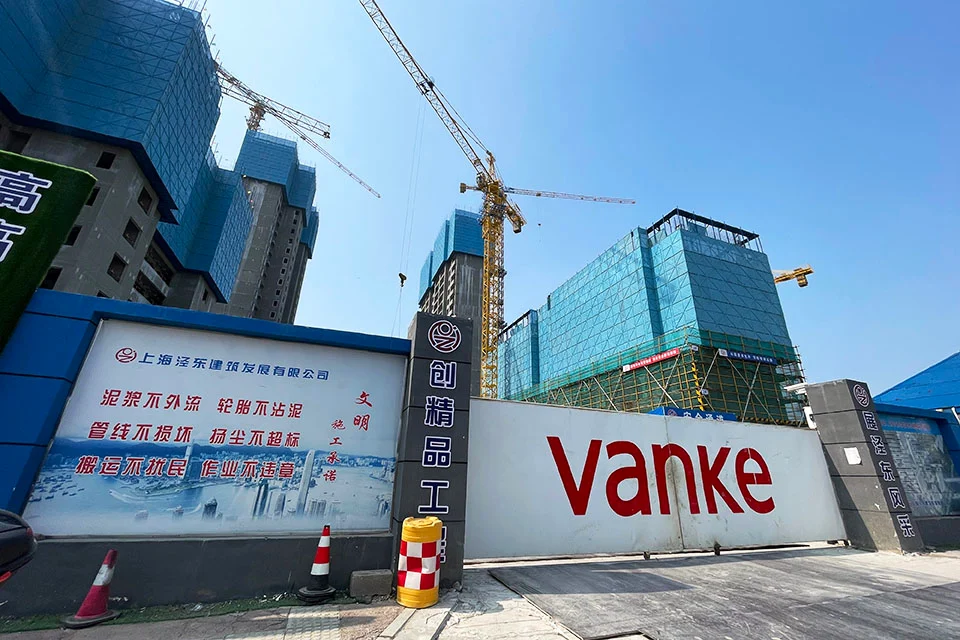Chinese banks are reportedly scrambling to bail out one of the country’s largest property developers Vanke after Moody’s lowered its credit rating to “junk” status on Monday.
Beijing has been working hard to rebuild faith in the country’s faltering real estate business, and it looks that China Vanke is on a mission to avoid the fate of Evergrande and Country Garden, both of which defaulted on their obligations and are on the verge of liquidation.
Chinese state media said Tuesday that 12 major banks, including the six largest state-owned institutions, were in talks to give Vanke with a syndicated loan worth up to 80 billion yuan ($11.2 billion) to fulfill looming repayment deadlines.
The loan amount is yet unknown, according to state media outlet Cailianshe, citing an unnamed source familiar with the planned transaction. Another official media site, the Economic Observer, said that various insurance companies had dispatched teams to Vanke’s headquarters for a new round of debt discussions in an effort to avoid a default according to a CNN business report.
Vanke, founded 40 years ago, was the country’s second largest developer by sales last year, but it has been hit hard by the decline in demand for flats and the drop in housing prices.
Vanke Stock Volatile
Vanke’s stock rose sharply in Hong Kong and Shenzhen following reports of potential new financing. On Tuesday, its Hong Kong-listed shares rose 10.3%, while its Shenzhen-traded stock increased 5.7%. However, they have remained in negative territory so far this year.
On Monday, Moody’s downgraded Vanke’s rating to Ba1, which is commonly known as a junk rating. That means the corporation must offer a higher yield on its bonds to compensate for the increased risk of payment default that bond investors assume.
“The rating actions reflect Moody’s expectation that China Vanke’s credit metrics, financial flexibility and liquidity buffer will weaken over the next 12 to 18 months because of its declining contracted sales and the rising uncertainties over its access to funding amid the prolonged property market downturn in China,” Kaven Tsang, senior vice president at Moody’s, said in a news release.
Other foreign ratings agencies, including S&P and Fitch, have maintained Vanke’s investment grade rating.
Vanke, founded in 1984 in Shenzhen, is a leading corporation in China’s real estate market. Its founder, Wang Shi, is regarded as the “Godfather” of the sector and has been compared to Donald Trump by Time magazine. It was mainland China’s first publicly traded property company, with a high-profile IPO in 1991 on the still-developing Shenzhen Stock Exchange.
To avoid a hostile takeover proposal from a Chinese activist investor, the company allowed the Shenzhen government to become its largest stakeholder in 2017. According to Refinitiv Eikon, the city now owns 33.4% of Vanke through Shenzhen Metro.
Before its liquidity problem became public late last year, the business was one of the few developers deemed financially stable by major rating agencies.
China’s Crumbling Property Market
Moody’s decision reflects rising concerns that toxic market circumstances in China’s property industry, such as low demand and a difficult financing environment, are dragging down even relatively sound enterprises with strong state support.
Vanke’s contracted sales fell 10% in 2023, reaching 376.12 billion yuan ($52.4 billion). In January 2024, its revenues fell by 32%.
Investors have been selling Vanke’s stock in recent months. Its Hong Kong-listed shares is down roughly 30% since November. So far this year, it is down 9%.
Beijing has been scrambling to address its real estate crisis since 2021, when Evergrande, the world’s most indebted developer, defaulted on its overseas loans. The issue then spread to scores more large developers, who also failed to repay creditors. The aftermath has harmed the confidence of homebuyers, businesses, and investors, posing a threat to the overall economy.
The stimulus measures implemented by Chinese authorities have so far failed to revitalize the sector. In 2023, property sales fell 6.5% from 2022. Property investment declined by 9.6%, marking the second consecutive year of decline.
Last week, China’s housing minister, Ni Hong, told reporters at the National People’s Congress that authorities will assist real estate developers’ “reasonable” financial needs.
He highlighted the recently formed “whitelist” method for injecting liquidity into the crisis-hit economy. Banks have provided development loans for over 6,000 property developments around the country.
But he also stated that Beijing will not bail out developers who are “seriously” in difficulties.
“For real estate companies that are seriously insolvent and have lost their operating capabilities, [we should] let them go bankrupt or be restructured,” he told the audience.
“We view the tone as negative,” Nomura analysts wrote on Monday. They said Ni has stated unequivocally that the government’s objective is to assure the completion of property developments, not to protect the developers’ enterprises.






